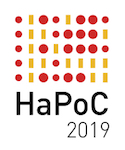|
|
|
Accepted AbstractsRamon Alvarado and John Symons/ Epistemic Injustice in the Deployment and Development of Data Science Sabine Ammon/ Artefact Knowledge. How AI challenges validation, robustness, and trust Troy Astarte/ On the Difficulty of Describing Difficult Things Eleonora Barelli/ Artificial neural networks as complex systems: an educational activity for showing the epistemological change introduced by machine learning Ethan Brauer/ The Dependence of Computability on Numerical Notation Davide Ceolin/ Towards an Ethics for Online Information Quality Paolo Coppola/ Redistribution in the Age of Datalism Martin Cunneen/ Changing the Culture of AI Ethics: Engineering Ethics for AI researchers Andre Curtis-Trudel/ Pluralism and Computational Individuation Fabio Fossa/ Literally speaking or in inverted commas? Reflections on the use of language in Robotics and AI Juan Luis Gastaldi and Luc Pellissier/ The Logic of Language: An alternative logical approach to machine learning based on the case of Natural Language Processing Davor Lauc and Ines Skelac/ Vectorizing Begriffsschrift: On the relevance of recent forays into the deep learning of word meanings to some traditional philosophical problems and vice versa Corey Maley/ Analog Computation and Representation Dale Miller/ Formal proof and trust Simon Modeste/ Correspondence between proofs and programs. An epistemological reading for a didactical perspective Carlo Montangero, Roberto Di Cosmo, Laura Bussi and Guido Scatena/ Saving the Software Heritage: the process Elisabetta Mori/ “Check Everything”: Validity and Correctness in LEO III Philippos Papayannopoulos, Nir Fresco and Oron Shagrir/ The Indeterminacy of Computation versus the Underdetermination of Theory Ivo Pezlar/ Meaning as Algorithm Alessio Plebe, Pietro Perconti and Giorgio Mario Grasso/ Deep Learning and Philosophical Debates Sébastien Plutniak/ Assyrian merchants meet nuclear physics: an history of early contributions from social sciences to automatic pattern detection in graphs (late 1950s-1970s) Helen Robertson/ Machine learning as a source of epistemic justification Henri Stephanou/ The two faces of modeling and implementation R.X. Schwartz/ Ulysses’ ropes and the inherent limits of digital self-control tools Mate Szabo/ Miklós Havass and Computerized Folk Music in 1960s Hungary Leonello Tarabella, Carlo Montangero and Laura Bussi/ A Case Study of Legacy Source Code: The Computer Music System TAU2-TAUMUS Adam Trybus/ Philosophical Foundations of Qualitative Spatial Reasoning: A Case for Bertrand Russell Marcelo Vianna/ Coordinating users to develop Brazilian Computing – CAPRE's role in controlling imports of computers and peripherals (1976-1979) Krzysztof Wojtowicz/ Non-Standard Models of Computation and Philosophy of Mathematics |


